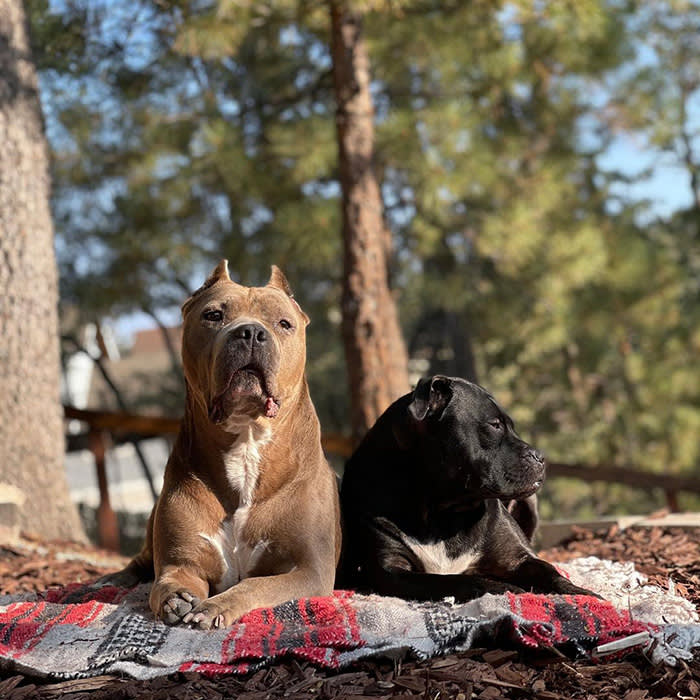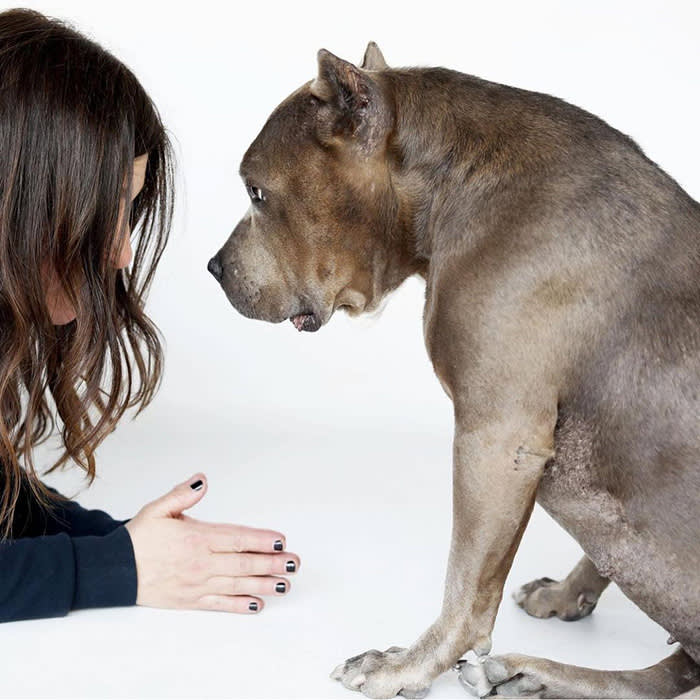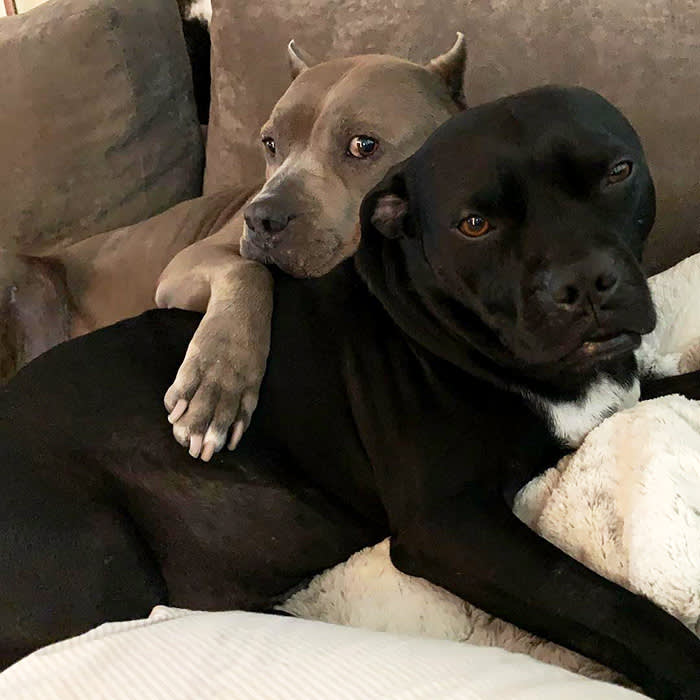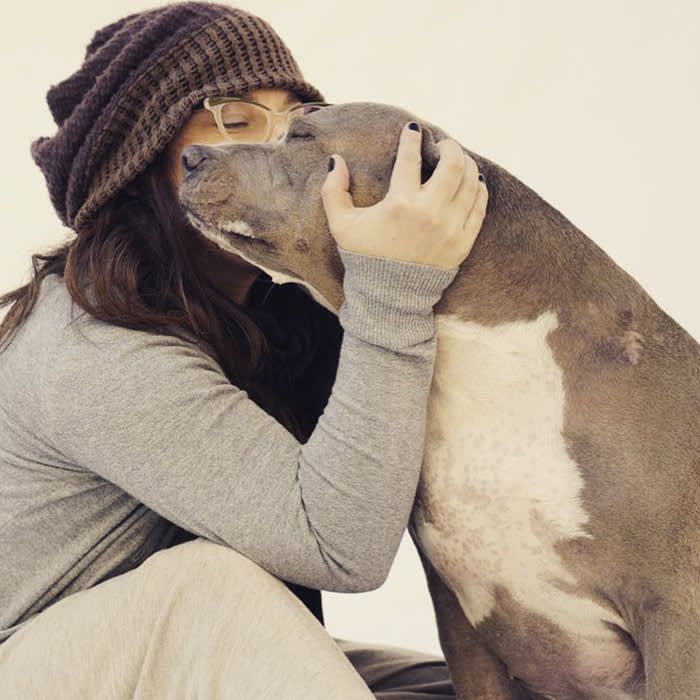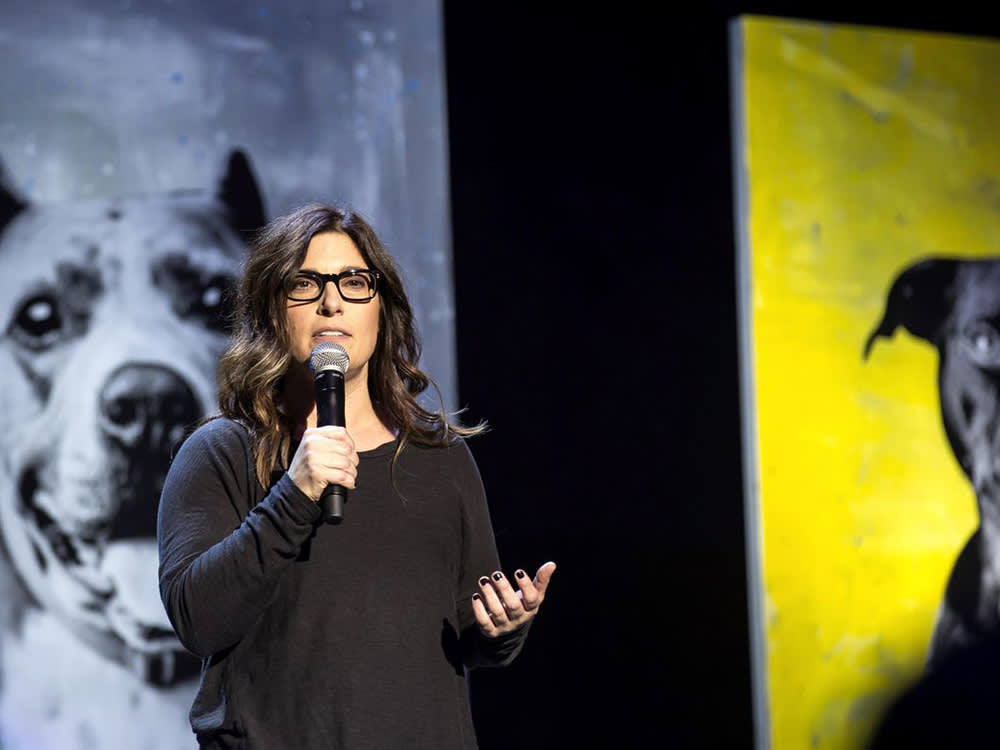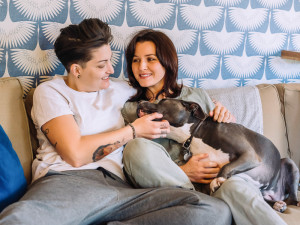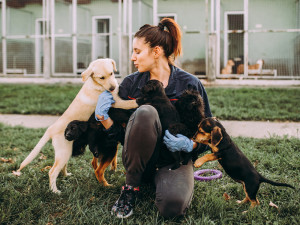Comedian Rebecca Corry Stands Up for Pit Bulls
“Comedy and entertainment — that’s my passion. But my purpose in life is saving dogs. And somehow I have managed to combine the two.”
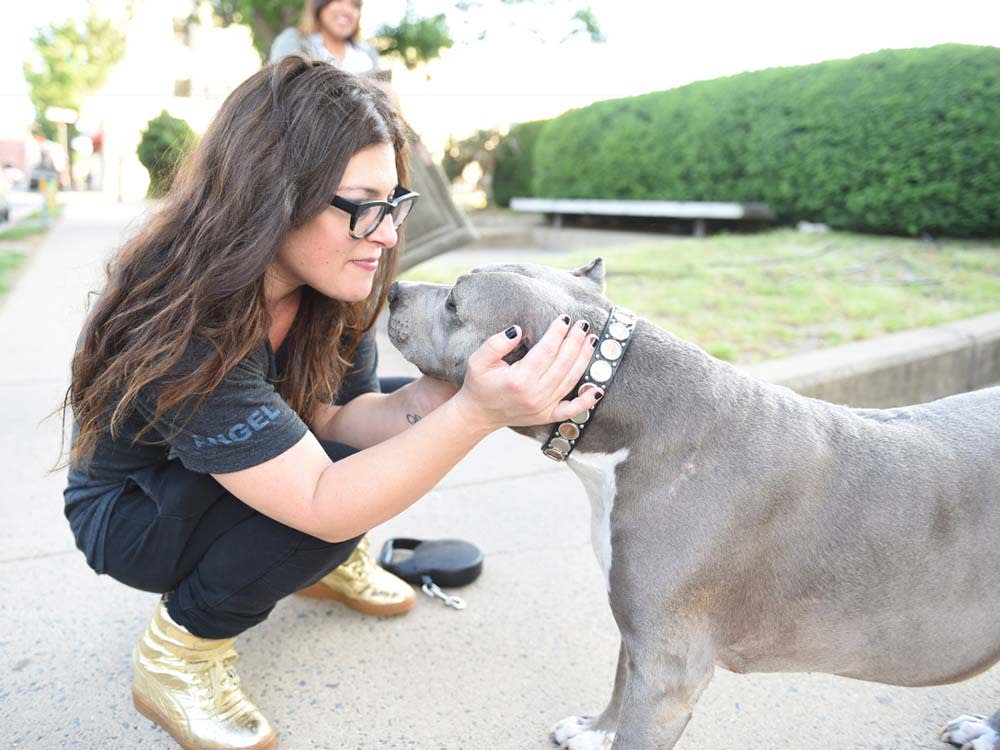
Share Article
To the Rescue is a column about visionary animal advocates.
Rebecca Corryopens in new tab has long had a knack for improving the lives of others. As a comedian, she has traveled the country bringing laughter to clubs and theaters. But 11 years ago she decided to extend that natural ability towards a group often marginalized and misunderstood — “Pit Bulls.” Inspired by Angel, a “pibble” she adopted, Corry started the Stand Up For Pits Foundationopens in new tab, a non-profit dedicated to ending the abuse and discrimination of Pit Bull-type dogs through education and advocacy. “Comedy and entertainment — that’s my passion,” she says. “But my purpose in life is saving dogs. And somehow I have managed to combine the two.”
SUFP’s hosts live events and comedy shows to raise funds and awareness, sponsors free Pit Bull-type dog spay/neuter clinicsopens in new tab for underserved communities, organizes donation drivesopens in new tab for shelters in need of supplies, awards Angel Grantsopens in new tab to rescue groups around the country in support of front-line rescue efforts, and showcases adoptable dogsopens in new tab on Instagram — thousands of Pit Bull-type dogs have been saved because SUFP networks them on social media. We caught up with Corry to talk about how backwards breed-specific legislation is, how humor is a reprieve in this dark world, and how her own pibbles, Todd and Sallyopens in new tab, are the biggest comedians of them all.
What was the inspiration behind starting Stand Up For Pits?
It was a Pit Bull-type dog named Angel, who I adopted many years ago. Through adopting her, I learned about the abuse and discrimination that these types of dogs endure. After becoming educated on it, doing nothing was not an option.

Was Angel your first personal experience with a Pit Bull-type dog?
She was not my first experience with a Pit Bull-type dog, which is what they are, as a side note. They’re not recognized as an individual breed. There is an American Pit Bull Terrier but the majority of the dogs in shelters are not actually American Pit Bull Terriers. They’re just mutts but they’re labeled as such. The term Pit Bull is used to describe them based on their looks, which is insane. Before Angel, I had a Dogo Argentino that is also labeled a Pit Bull-type dog.
She had a huge scar down her back (someone had dumped battery acid or some sort of chemical down her back) and her ears were cut off — like home cropped. I don’t know how they did it, but it could have been scissors or razor blades. I guess her appearance was jarring to some people, but I thought she was the cutest thing ever. When people saw her, they were often frightened, so that’s how I started experiencing the discrimination and ignorance often directed towards these types of dog.
As you mentioned, the American Kennel Club does not recognize Pit Bulls as a breed. What challenges does this create for how they’re treated?
It’s terrible. Mainly because it might be the dumbest thing ever. I mean, seriously, just to make it as clear as possible, it really is the dumbest thing. It’s such a reflection of how stupid humanity sadly is to look at a dog and deem it a type based solely on its appearance. Short hair or a square head? It’s a Pit Bull. Then to use that term and discriminate against all the dogs that fall underneath that umbrella because of what they look like is total insanity.
And shelters are so quick to label dogs as Pit Bull types. I’ve seen 15-pound dogs that are clearly French Bulldogs labelled as Pit Bull-type dogs by shelters. Then compound that with all this ridiculous breed-specific legislationopens in new tab, the laws that discriminate against them because of their label. It skews statistics and makes Pit Bulls appear more dangerous.
“It’s a dark world for these dogs and most of them don’t even stand a chance.”
Pit bull-type dog bans and restrictive rental regulations are still common at the city level. What role does policy play in the work you and your organization do?
We’re certainly not lobbyists. We don’t present bills or even really tell people what to do or how to think or whatever. We just provide facts. And the main fact is abuse and discrimination against any being, whether it has two or four legs, is wrong. Breed-specific legislation is actual discrimination. It costs taxpayers millions of dollars and it’s shameful. But that’s why, unfortunately, we exist. We have to educate and advocate and we’re trying to save as many of these lives as possible.
SUFP holds frequent comedy events to help raise awareness and advocate for rescue efforts. What impact does framing issues like this associated with Pit Bulls through a more humorous lens afford your ability to educate?
It’s everything. It has and continues to change the landscape of advocacy and activism with regards to these types of dogs, because ultimately this is one of the most polarizing, darkest causes. These dogs are the most abused, most discriminated, most fought, and most killed by shelters. I mean, it’s dark. But it’s a real dark world for these dogs and most of them don’t even stand a chance. And these are just the ones we know of.
So when you try to enlighten and educate people about something so unbelievably dark and unfair, there has to be reprieve — there has to be an opportunity to also celebrate how great they are and remind each other, and society, why it’s so important to keep fighting for them. Because they’re all born inherently good. Through humor and those moments of reprieve, it’s more effective. People can take a breath and take a break to enjoy them and enjoy the cause.
“I think humans could learn a lot about how these dogs suffer what they do and continue to be so unbelievably loving.”
Outside of public perceptions, what makes Pit Bull-type dogs unique pets? What are your pibbles, Todd and Sally’s personalities like?
They are the biggest dorks you’ve ever met in your life. In my opinion, this type of dog is truly the most spectacular type of dog on the planet. They’re just so funny. As a comedian and someone who’s been in the humor world for a few decades, I can tell you these guys are natural comedians. And they are also super, super smart. They have ideas, souls, emotions, and they’re super connected to their people. Which is good because they’re big babies too — cuddly and needy as any other dogs. They’re just the best.
I mean, I could go on and on about Todd and Sally, and they’re both totally different. Though they both have suffered extreme abuse in different ways, their inherent goodness can’t be broken even by the most evil people on the planet. They don’t forget but they choose to live in the moment. I think humans could learn a lot about how these dogs suffer what they do and continue to be so unbelievably loving.
As someone who recently adopted a Pit, I quickly discovered that one of their lesser-known traits is that they’re generally pretty doofy. As a comedian, how much material do you mine from just hanging out with your dogs?
It’s never ending — I have hours of material about them. The stories are endless. They are absolutely hilarious. And what’s so great for me in particular is the dogs in my life are always just better than me. They love everyone and I literally hate everyone. There is this great juxtaposition because I’m constantly raging because I can’t believe how stupid people are, and they’re just the best. They just love everyone.
How difficult is it to marry art and activity?
It has not been difficult at all for me. I don’t know if it’s because advocating on behalf of the dogs and being a comic are so specific. But for me it has been seamless, easy, and oddly natural. Comedy and entertainment — that’s my passion. But my purpose in life is saving dogs. And somehow I have managed to combine the two.
Comedy as an industry is a notoriously difficult environment. How has this prepared you to deal with critics in the Pit Bull world?
I think my whole life has prepared me to deal with morons, from my upbringing to things I have endured in my life personally. Comedy is one of the grossest industries, in my opinion, and filled with some of the most egotistical, self-centered people. So when someone hates a type of dog, I just add them to the pile of human garbage. People are the largest barrier Stand Up For Pits often faces in its advocacy. People don’t like truth. They would prefer that you keep it easy, light and breezy, rainbows, and butterflies. But I don’t operate at that level. I never have. So when I tell the truth and I speak my opinion, it is always met with criticism and hatred. You can hold people accountable in lawmaking and reinforce laws that will help protect the animals, but you can’t save them all and I’m not ever going to say that or pretend that that’s a real option.
What advice would you give someone considering adopting a Pit Bull-type dog?
I would say, understand that every single one of these dogs is an individual. Not a single one of them is the same, just like people, and every single one of them is going to require different things. It’s up to you to change your lifestyle to help meet their needs. They’re not robots or toys. They’re not for us to program to fit into our box. We need to respect them as individuals and treat them as such, period. Also know that they’re a gift and a privilege and that they’re born inherently good. It’s humans who continue to fail them. This a lifelong thing. Pit Bulls are strong but they have needs, and that is your responsibility to meet those.
What’s next for Stand Up For Pits?
I always say the same thing when I get asked this, and it’s that I wish I was announcing that I’m shutting it down. Because I wish it didn’t need to exist. But the reality is what’s next is the next life that we can save — the next dog. And we can help change the next person’s mind through educating, advocating, and doing the work that we do in the capacities in which we do it.
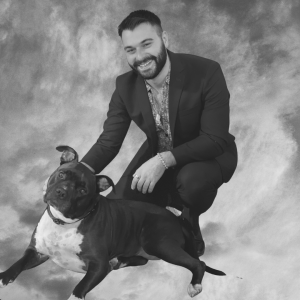
Sean Zucker
Sean Zucker is a writer whose work has been featured in Points In Case, The Daily Drunk, Posty, and WellWell. He has an adopted Pit Bull named Banshee whose work has been featured on the kitchen floor and whose behavioral issues rival his own.

